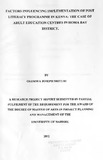| dc.description.abstract | The study was conducted to establish factors influencing implementation of post
literacy programme at adult education centres in Homa bay district. The study aimed at
finding out why learners’ living standards had been improved by the programme. The
sole purpose of post literacy programme was to help neo-literates apply the knowledge
and skills gained so as to uplift their socio-economic standards but that wasn’t
forthcoming. Post literacy programme aims at helping neo-literates consolidate, retain
and utilize basic literacy skills acquired at the basic literacy level. Globally there is
evidence of post literacy programme to overcome the enormous numbers of neo-literates
relapsing back into illiteracy. The objectives of the study were to determine the extent to
which provision of resources, how motivation of instructors and adult learners,
supervision of District Adult Education Officer and divisional Adult Education Officers,
and the learning environment influenced implementation of post literacy programme.
Four research questions based on the mentioned objectives to guide the study had been
formulated. Related literature reviewed identified teaching/learning materials, facilitators,
funding, instructors’ and adult learners’ motivation, District Adult Education Officer’s
and Divisional Adult Education Officers’ expertise in programme supervision,
availability of relevant reading materials, condition of seats and distance covered by
learners to adult centres as the independent variables that could be influencing post
literacy programme implementation. The adult learning theory and principles of adult
learning and Paul Freire’s theory of adult literacy were identified to support the study.
The significance of the study in relation to EFA goals, MDGs and vision 2030 had been
outlined. Descriptive survey design was adopted for the study during data collection. The
district adult education officer and 2 divisional adult education officers were selected
through purposive sampling while 8 adult education instructors and 230 neo-literates
were selected through simple random sampling and the study targeted a total population
of 666 people out of which a sample of 241 respondents were selected for the study.
Adult education instructors have the strongest influence on learning in adult centres.
Instrument validity was done by supervisor while reliability was done using test-retest
method. Data collection was conducted by the researcher. Collected data was analyzed
using descriptive, percentages and inferential statistics. The study revealed that requisite
resources were lacking at the adult education centres, motivation of adult instructors and
learners was non-existent, the district adult education officer and divisional adult
education officers were constrained in terms of facilitation for programme supervision
and the learning environment wasn’t appealing to the learners. | en |

